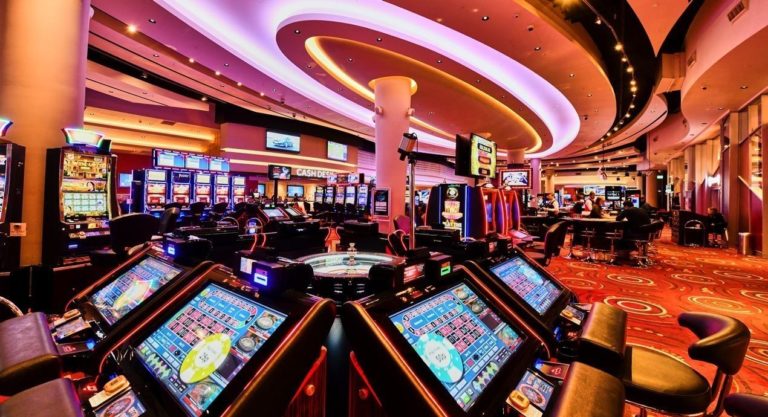Analyzing the Morality of Gambling Casinos
Casino gaming has long been a subject of fascination and debate, drawing in millions of players globally. With a mix of chance, skill, and the thrill of uncertainty, casino games offer an exhilarating escape from everyday life. However, as entertainment becomes ever more available, it calls for a deeper examination of the ethical implications surrounding these games.

At the heart of the discussion lies the issue of whether casinos promote safe gambling or take advantage of at-risk individuals. OKE179 The appeal of potential winnings versus the truth of losses can create a challenging dynamic, and understanding this balance is crucial for both players and operators. As we delve into the ethics of casino gaming, we will explore the duties of casinos, the effects on society, and the measures that can be taken to foster a better gaming environment.
The Impact of Casino Gaming on Society
Casino gaming has a notable influence on the community, affecting not only the economy but also interpersonal dynamics and local frameworks. The funds generated from casinos can lead to job creation and boost local economies, as they provide various employment opportunities in multiple fields including food and beverage, entertainment, and retail. However, while the financial benefits can be significant, communities often struggle with the potential negative impacts that arise from higher gambling activity.
Additionally, the presence of casinos can lead to an increase in gambling addiction, presenting significant challenges for individuals and families. The excitement of casino games can quickly transform into a habitual habit, affecting connections with others and leading to financial instability. Many players may find it difficult with the loss of control over their gambling behaviors, resulting in a need for assistance programs and help to address this increasing issue. The social cost of gambling addiction can extend through families and neighborhoods, creating an urgent need for sensible gambling approaches.
In addition to the economic and social ramifications, casino gaming often reflects cultural attitudes towards risk and entertainment. It can encourage a sense of excitement and leisure, attracting tourists and boosting tourism. However, this allure may also conceal the wider implications of gambling as a form of entertainment, raising ethical questions about its promotion and availability. As communities weigh the advantages and drawbacks of casino gaming, the need for responsible practices and regulation becomes increasingly critical in ensuring that the positive aspects are maximized while reducing the negative effects.
Ethical Issues in Betting Practices
The morality of gambling operations often center around the potential for addiction and its consequences on people and households. Betting can lead to serious monetary distress, impacting not only the betters but also their loved ones. As individuals become caught in the appeal of winning, many lose sight of their budget, which can result in catastrophic outcomes such as insolvency. This poses moral questions about the duty of casinos in fostering responsible gambling habits and providing support for those who may be struggling with gambling addiction.
Another critical concern is the promotion of betting to at-risk populations. Casinos often aim at low-income individuals or neighborhoods with the offer of quick gains, which can continue patterns of poverty and despair. In this context, the ethics of marketing strategies used by gambling establishments come under examination, as they may exploit the desperation of individuals seeking an escape from financial hardships. This exploitation raises moral questions about the integrity of the betting industry and its responsibility to safeguard its most at-risk customers.
Additionally, the impact of gambling gaming on society as a whole cannot be overlooked. While some argue that casinos create jobs and stimulate local economies, others point to the social costs associated with dysfunctional betting, increased criminal rates, and a burden on public resources. Balancing economic benefits with the risk for social harm presents a complex ethical dilemma for policymakers and gambling operators alike. The challenge lies in finding a ethical approach that prioritizes the welfare of individuals and communities while still permitting for the pleasure of gambling activities.
Regulatory System and Duties
The regulatory structure surrounding gambling games is designed to ensure justice, honesty, and participant protection. Different government entities and gambling commissions establish and apply regulations that dictate how casino operations operate, the standards for game creation, and the processes for managing rewards. These regulations differ by region but commonly involve permit requirements for providers and rigorous measures to stop cheating and dishonesty.
In also to governing bodies, casino businesses bear considerable duty in maintaining ethical standards within their venues. They must implement ethical player practices that support participant protection and consciousness, including offering self-ban options and offering information about the dangers related to gaming. Operators are also obligated for educating employees to identify signs of difficult gambling and know the appropriate steps to support customers in distress.
Moreover, transparency in casino operations is essential for gaining and preserving public trust. Casinos should offer clear details about the chances of activities, promotional offers, and any related risks. By promoting an culture of transparency and accountability, casinos can help reduce the possible negative impact of gambling while boosting the overall gaming experience for all participants.
